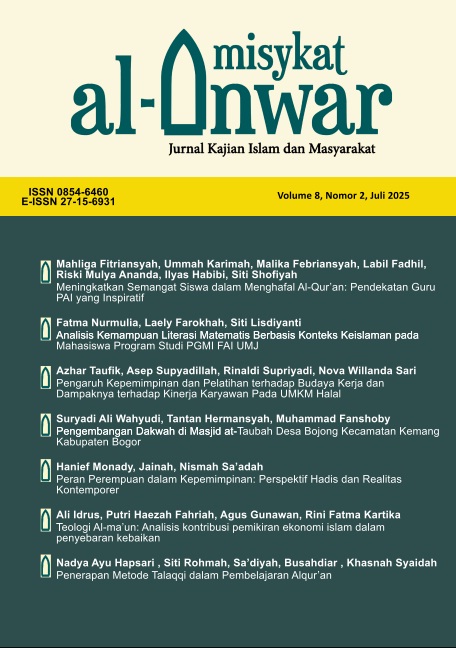Digital Parenting Style Perspektif Al-Qur’an: Kajian Tafsir Tematik atas QS Luqman ayat 13-19
Main Article Content
Abstract
This study examines moral values in QS. Luqman verses 13-19 as a basis for parenting in the digital era and formulates a digital parenting strategy based on Qur'anic principles that are relevant to the challenges of the times. The analysis was conducted qualitatively with descriptive data presentation. The maudhui interpretation method and Fazlur Rahman's double movement approach were used to connect historical and contemporary meanings. Data were collected through a study of the verses of the Qur'an and interpretations as well as from books and articles about Digital Parenting. The results of the study show that values such as monotheism, gratitude, amar ma'ruf nahi munkar, and social etiquette in QS. Luqman verses 13-19 are relevant as a moral and spiritual basis in facing parenting challenges in the digital era, such as exposure to negative content, technology addiction, and declining moral character of children. These findings confirm that the integration of Qur'anic principles can strengthen ethical and empowering parenting strategies, as well as build children's character solidly morally and spiritually. In conclusion, strengthening moral values from these verses is important for building a resilient young generation amidst the rapid development of technology. This study provides practical and theoretical contributions to the development of Qur'anic value-based parenting strategies in a digital context.
Keyword: Digital parenting, thematic interpretation, QS. Luqman, digital era
Article Details

This work is licensed under a Creative Commons Attribution-NonCommercial-ShareAlike 4.0 International License.
All manuscripts published in the Misykat al-Anwar Journal of Islamic Studies and Society are entirely the property of the author, as for the entry and unpublished script of the journal, the copyright is wholly the property of the author.
All manuscripts published in the Misykat al-Anwar Journal of Islamic Studies and Society are open to the public by following the provisions of the CC-BY-NC-SA (Attribution Non Commercial Share Alike) platform where everyone is allowed and permitted to adapt, the results of the study with the provision should provide citation credit to the author (citation) not for commercial purposes, and one must make a similar provision to the results of his research.
---
Semua naskah yang diterbitkan dalam Misykat al-Anwar Jurnal Kajian Islam dan Masyarakat sepenuhnya menjadi hak milik penulis, adapun naskah yang masuk dan belum diterbitkan oleh jurnal, hak cipta sepenuhnya milik penulis.
Semua naskah yang diterbitkan dalam Misykat al-Anwar Jurnal Kajian Islam dan Masyarakat terbuka untuk umum (open access) dengan mengikuti ketentuan platform CC-BY-NC-SA (Attribution Non Commercial Share Alike) semua orang diperbolehkan untuk menyadur, merujuk dan mengadaptasi tulisan/hasil penelitian dengan ketentuan harus memberikan kredit rujukan kepada penulis (citation) bukan untuk kepentingan komersial, dan seseorang harus melakukan ketentuan yang serupa terhadap hasil penelitiannya.
